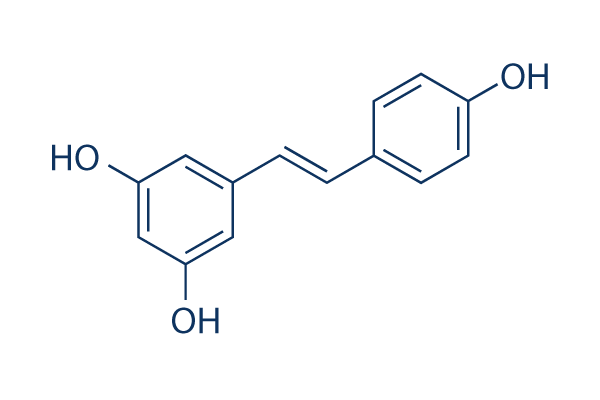ResveratrolCAS号: 501-36-0分子式: C14H12O3分子量: 228.24描述纯度储存/保存方法别名外观可溶性/溶解性靶点In vitro(体外研究)In vivo(体内研究)参考文献
| 产品描述 | |
| 描述 |
Resveratrol is a phytoalexin produced naturally by several plants with anti-cancer, anti-inflammatory, blood-sugar-lowering and other beneficial cardiovascular effects. |
| 纯度 |
>98%
|
| 储存/保存方法 |
Store at -20℃ for one year(Powder);Store at 2-4℃ for two weeks;Store at -20℃ for six months after dissolution.
|
| 基本信息 | |
| 别名 |
白藜芦醇
|
| 外观 |
白色或类白色结晶性粉末
|
| 可溶性/溶解性 |
DMSO :45mg/mLwarming(197.16mM)
|
| 生物活性 | |
| 靶点 |
SIRT1 ,SIRT2 ,Quinone reductase 2 ,IKK β ,COX1
|
| In vitro(体外研究) |
Resveratrol inhibits the activity of Cyclooxygenase and lipooxygenase, PKCs and p56lck, ERK1, JNK1, p38, IKK β, Src, STAT3, Ribonucleotide Reductase, DNA polymerases α and δ, PKD, PKC α, Quinone reductase 2, and Aromatase with IC50 of from 0.035-60 μM. Resveratrol is also an activator of Adenylyl cyclase and AMPK with EC50 of 0.8 μM and 50 μM, respectively. The roles of Resveratrol as inhibitor or activator enable its effects on decreasing cell inflammatory associated behaviors, growth inhibition and induction of apoptosis in cancer cells, reversal of endothelin-1 stimulated cell responses, inhibition of phorbol ester-induced expression of COX-2, inhibition of DNA synthesis in cell, resistance to menadione-induced cell death, and improvement of cell mitochondrial function and glucose/lipid metabolism. Resveratrol is also an activator of sirtuins. Resveratrol lowers the Michaelis constant of SIRT1 for both the acetylated substrate and NAD+, and increases cell survival by stimulating SIRT1-dependent deacetylation of p53. In yeast, Resveratrol mimics calorie restriction by stimulating Sir2, increasing DNA stability and extending lifespan. Resveratrol is effective at protecting isolated rat hearts against ischemia/reperfusion injury via its antioxidant activity, with improved recovery of developed pressure and aortic flow, reduction of malondialdehyde concentrations and reduction of infarct size.
|
| In vivo(体内研究) |
Resveratrol improves health and survival of mice on a high-calorie diet. Resveratrol (22.4 mg/kg/day) shifts the physiology of middle-aged mice on a high-calorie diet towards that of mice on a standard diet and significantly increases their survival. Resveratrol produces changes associated with longer lifespan, including increased insulin sensitivity, reduced insulin-like growth factor-1 (IGF-I) levels, increased AMP-activated protein kinase (AMPK) and peroxisome proliferator-activated receptor-γcoactivator 1α(PGC-1α) activity, increased mitochondrial number, and improved motor function. Resveratrol opposed the effects of the high-calorie diet in 144 out of 153 significantly altered pathways. Resveratrol has been shown to inhibit the initiation and growth of tumors in a wide variety of rodent cancer models. Dose of Resveratrol as low as 200 μg/kg daily already shows efficacy in a rat model of colon carcinogenesis. At higher dose of 40 mg/kg, Resveratrol increases the survival of mice with subcutaneous neuroblastomas from 0% to 70%. Resveratrol inhibits vascularization in the corneal micropocket assay in mice at a dose of only 48 μg/kg when administered daily. Resveratrol shows beneficial effects on heart disease. Resveratrol blocks the increase in platelet aggregation induced by a hypercholesterolaemic diet. Resveratrol increase expression of both endothelial and inducible nitric oxide synthase. In stroke-prone, spontaneously hypertensive rats, resveratrol significantly reduces markers of oxidative stress such as glycated albumin in serum, and 8-hydroxyguanos-ine in urine. Providing Resveratrol in drinking water for 15 days (1 mg/kg) is sufficient to improve the recovery in function and coronary flow of isolated hearts. Resveratrol displays anti-inflammatory activity in vivo. Resveratrol significantly reduces both acute and chronic chemically induced oedema, lipopolysaccharide-induced airway inflammation and osteoarthritis, and helps to prevent allograft rejection. Intravenously administered Resveratrol decreases inflammation induced by ischaemia/reperfusion, oxidants generated by hypoxanthine/xanthine oxidase (HX/XO) or platelet-activating factor, but not leukotriene B4 in rats. Resveratrol shows beneficial effects on stroke and brain damage. Resveratrol administered intravenously significantly decreased ischaemic volume and brain water content at the extremely low doses of 100 ng/kg and 1 μg/kg after middle cerebral artery occlusion in rats.
|
| 参考文献 | |
| 参考文献 |
[1] Pirola L, et al. IUBMB Life, 2008, 60(5), 323-332. [2] Howitz KT, et al. Nature, 2003, 425(6954), 191-196. [3] Baur JA, et al. Nat Rev Drug Discov, 2006, 5(6), 493-506. [4] Baur JA, et al. Nature, 2006, 444(7117), 337-342. [5] Wang YJ, et al. Zhonghua Yi Xue Za Zhi, 2003, 83(7), 534-536. [6] Joe AK, et al. Clin Cancer Res, 2002, 8(3), 893-903. [7] Lee MH, et al. Cancer Res, 2009, 69(18), 7449-7458. |
分子结构图

